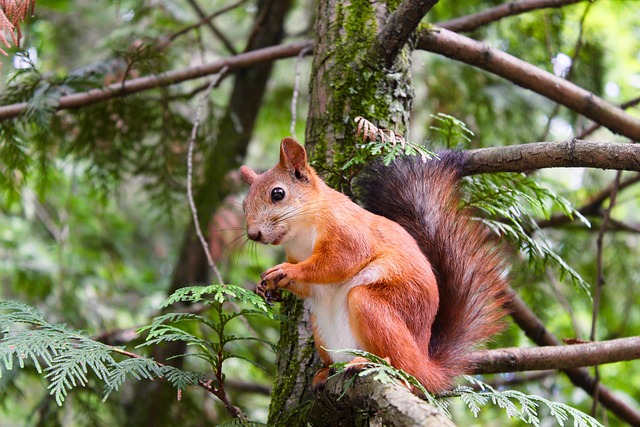Squirrels immediately come to mind when we consider them because of how cute they are. What would happen to a fluffy-tailed squirrel that weighs just over 300 grams if it were to fall from an unknown height? Does falling cause squirrels to perish?
We will ignore the fact that gravity, which is not a force, is what draws objects to the earth based on their mass. If not for the resistance of the air, a hammer and a feather would descend simultaneously.
In truth, their mass has no bearing on how quickly they are drawn toward the Earth. It is heavily influenced by how hard they hit the ground. So, how is that connected to our question of whether “can squirrels die from falling?” To learn more, continue reading.
Table of Contents
Can Squirrels Die from Falling?
Despite their propensity to dart around in high places, especially on trees and roofs, squirrels rarely die from falling. In contrast, if they fall, they could sustain a range of wounds or even none at all.
Squirrels have tiny bodies and weigh in the range of 400 to 700 grams. They have a significantly lower terminal velocity as a result of this.
Because of its large surface area to body mass ratio, a squirrel can control its descent and survive a collision. In most cases, a squirrel will survive a fall from any height.
Squirrels only reside in trees that are manageable in height because they are highly intelligent creatures. Squirrels will never be observed residing in extremely high branches as a result. Do they ever drop from trees, then? Yes, squirrels frequently slip when running across trees. They consequently stumble and fall through twigs and branches before touching the ground. So how frequently do squirrels perish from falling? Only being impaled by a limb or by a predator causes squirrels to die.
Squirrels, on the other hand, typically have the ability to avoid falling from the moment they are born. They frequently spread their bodies out like parachutes and extend their legs widely when falling to reduce air resistance. They have more time to concentrate on their landing location, which enables them to do so gently and without suffering any severe repercussions.
What percentage of the time do squirrels die from falling, compared to other animals? Squirrels may survive falls that would kill other creatures due to their resistance to falling. The force of a squirrel’s fall is roughly 10 times less than its resistance to it. Therefore, a squirrel would probably never die from a fall, regardless of how high the drop.
Can Baby Squirrels Die from Falling?
We now know that squirrels are excellent climbers and that they cannot fall from a tree, but what about young squirrels? Squirrel babies can be killed by falling.
No, baby squirrels do not perish from falling. Their mothers take care of them, and due to their natural ability to climb a tree efficiently, there are very minimal chances of falling.
However, what should one do if a baby squirrel falls out of a tree?
- Give the mother squirrel time to reclaim her young before relocating them if you find a baby squirrel that has fallen from the tree.
- Keep people and pets away, leave the baby squirrel alone if it is hurt, and keep an eye on them from a safe distance.
- Get him as soon as possible to a wildlife rehabilitator if you notice that the mother squirrel is not coming to save him.
When a Squirrel Falls, How Far Must It Go Before It Dies?
Due to their low terminal velocities, squirrels can withstand drops from incredibly high altitudes. The impact of the landing, rather than the height of the fall, proves fatal to squirrels.
If they land flat and on soft ground, they have a chance of surviving even if they fall from a great height. Falls that land on concrete, rocks, anything sharp, or a swimming pool, however, can cause fatal injuries. A squirrel may fall hard and scramble away before dying a short distance away.
If you’re wondering, the response is indeed yes.
If the circumstances are right, a squirrel can survive a fall of 200 feet. The ability of squirrels to absorb energy at terminal velocity allows them to survive drops of at least 200 feet. Its slow final velocity is primarily caused by the squirrel’s bulk. The large area compared to mass of a squirrel means it doesn’t feel the strong pull of gravity.
To lessen the impact of a fall, the structure was designed. Its tail functions as a parachute to soften the impact of a 200-foot fall.

How Do Fallen Squirrels Land?
Squirrels can guide their fall and land on their feet because of their extraordinary flexibility. As a result, there are far fewer opportunities for squirrels to perish from falling. What then gives them the ability to do it? The secret lies in how they use particular body parts. Ideally, their physical makeup aids in this.
First off, squirrels’ tiny, elastic bodies aid them in controlling air resistance. Although their limbs change the amount of inertia needed to land on their feet, their bushy tails help them steer and control their movement in the air.
Regardless of how far it is falling, a squirrel always lands the same way. This is due to the fact that when a squirrel falls, the same rules are always in effect. One of a squirrel’s forelegs is the first part of its body to touch the ground or another tree when it jumps or falls from a tree. They are unlikely to lose control of their landing.
How Many Squirrels Die from Falling?
As long as they land on solid ground, almost no squirrels die from falling. Even if it hits soft ground after falling, a squirrel won’t perish. Even though it might experience a slight shock, the animal will move on.
Squirrels’ resistance to falling allows them to survive falls that would kill other animals. In comparison to the force of the fall, a squirrel has a resistance to falling that is roughly ten times greater. Therefore, no matter how high the drop, a squirrel could never die from a fall.
Related posts:
- Can Squirrels Eat Raisins?
- Squirrels Consume Oranges, Right?
- Eat Squirrels Crows?
Can Squirrels Die from Falling Out of a Tree?
It is uncommon for squirrels to perish after falling from a tree. Most squirrels would survive a fall from a tree as long as they landed on grass or some vegetation.
Numerous individuals have seen squirrels fall from 60 to 80 foot tall trees. And the squirrels typically survived the fall. However, surviving a fall is different from escaping an accident-free. Even if a squirrel makes it out alive after falling from a very high tree, it didn’t mean it was unharmed.
How Long Does a Squirrel Have to Fall to Die?
Squirrels can fall from great heights and survive because their terminal velocity is low. Squirrels are killed by landing rather than falling, which is why.
They can survive falling from very tall trees or even buildings if they land flat on soft ground. However, a fall can result in fatal injuries if the person hits concrete, a rock, something sharp, or a swimming pool. A squirrel may flee after taking a significant fall only to perish a short distance away.
Can a Squirrel Survive a 200 Ft Drop?
A squirrel can endure a 200-foot fall in the right circumstances. Squirrels can survive falls of 200 feet or even higher because they can withstand impacts at their terminal velocity. The squirrel’s body is primarily to blame for its low terminal velocity. Gravity isn’t pulling a squirrel too strongly to the ground because of the large area/mass ratio.
It’s designed to lessen the effects of falling. A 200-foot drop is softer on them thanks to the parachute in their tail.
Can a Squirrel Survive a Fall from a Plane?
The likelihood of a squirrel surviving a fall from a plane is low. A squirrel’s chances of surviving a fall from a jet plane are extremely slim. When a jet reaches its cruising altitude, the squirrel would already be frozen.
However, a squirrel may live after falling from a small aircraft. Falling from a plane might be manageable for a squirrel if they land on something soft. The squirrel won’t survive the fall if it hits a freeway, the ocean, or a rocky area.
Can a Squirrel Survive a Fall from the Empire State Building?
Even after falling from the Empire State Building, a squirrel is resilient. A squirrel can survive a fall from a structure as tall as the Empire State Building because of its terminal velocity.
Are Squirrels Smart?
Squirrels are indeed intelligent. They have expertise. Different vocalizations and scent marking are used by them to communicate with one another.
As a signaling tool, squirrels also twitch their tails to indicate insecurity or potential danger. Additionally, they are masters of adaptation and have the capacity to survive almost anywhere. Here are some of the facts about squirrels that make them intelligent than other rodents;
- Quick learners
Squirrels pick things up quickly. They are able to learn through observation.
- Great Memory
The memory of squirrels is superb. To facilitate access later, they bury their nuts underground. Because of their excellent memory, they can learn new things in this way.
- Intelligence
The two characteristics that set squirrels apart from other rodents are memory and the ability to live anywhere.
What Animals Kill Squirrels?
There are numerous species of animals that prey on squirrels. A few of them are:
- Weasels
- Coyotes
- Badgers
- Foxes
- Bobcats
Squirrels are preyed upon by a variety of animals in North America, including coyotes, bobcats, red foxes, grey foxes, and snakes.
What Animals Can Survive a Fall from Any Height?
The squirrels’ lightweight, low-velocity defense mechanism that assists and saves them when they fall from a height has already been described.
Do you wonder what animals are capable of withstanding falls from any height?
Yes, animals like mice and rats can survive falls from any height.
Conclusion
Even though they are tough, squirrels can still be harmed. These brave rats frequently survive their dives. Due to their slow terminal velocity, they can withstand impact during a fall.


